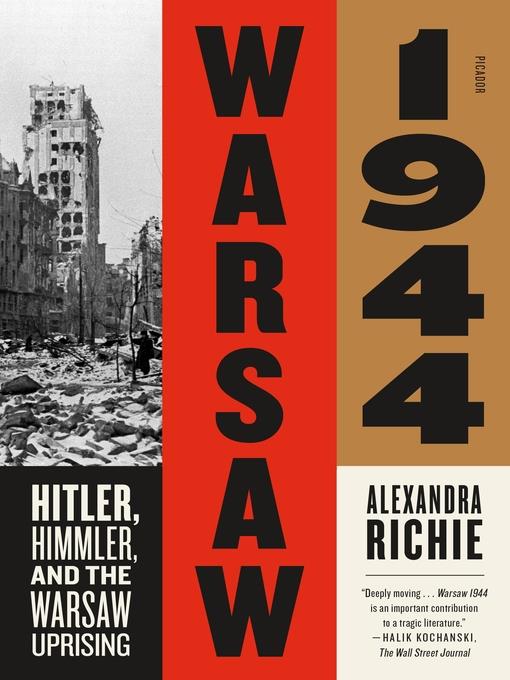
Warsaw 1944
Hitler, Himmler, and the Warsaw Uprising
کتاب های مرتبط
- اطلاعات
- نقد و بررسی
- دیدگاه کاربران
نقد و بررسی

January 13, 2014
Heroic yet doomed, the 1944 Warsaw Uprising was an act of resistance launched by the underground Polish Home Army, with extraordinarily adverse effects. The summertime battle was the catalyst for the Nazis long-planned destruction of the once glorious Polish capital chronicled here with astonishing precision by historian and Warsaw resident Ritchie (Faust's Metropolis). Adolf Hitler and Heinrich Himmler were determined to eradicate not just the Polish Jews, but the entire Polish nation, people they viewed as less than human. Yet the two Nazi leaders, authors of the madness, play supporting roles here. The unimaginable barbarity that seized Warsaw was unleashed by some of the most sadistic S.S. officers in the Nazi regime. Despite pleas from Winston Churchill, the U.S. and Great Britain ultimately did little to help the Poles lest they antagonize an indifferent Josef Stalin. The Russian leader was content to have his armies wait out the urban warfare as the Germans reorganized to crush the Polish fighters. Richie is an unrelenting storyteller: Page turns offer little respite for the reader in this grim and chilling book that delivers exhaustive and unforgettable details of this gruesome chapter of World War II. B&w illus.

December 1, 2013
A sympathetic delineation of one of the grimmest chapters in a savage war. Though neither a World War II scholar nor military expert, Richie (Faust's Metropolis: A History of Berlin, 1998) has the advantages of living in Warsaw and familiarity with the location and resources--e.g., a collection of underground newspapers from the war years. As a result, her work exploring what she considers a largely unexposed episode at war's end--not to be confused with the suicidal Warsaw Ghetto Uprising of 1943--remains engrossing despite the nearly unreadable catalog of horrors inflicted on the victims. The Polish people had been resisting German occupation since the first bombing and invasion in September 1939. Early on, Soviet collusion with Germany in carving up the country left Poles wary of any collaboration, which would have crucial consequences in the summer of 1944, when communication between the Polish and the approaching Soviets might have helped bolster a defense of the city. By June 1944, the Soviets had launched Operation Bagration, creating havoc for the German Army Group Centre and causing nearly half a million casualties. To everyone's amazement, the Germans began to withdraw from Warsaw until the assassination attempt on Hitler in July, which shook his trust in his generals and elevated Heinrich Himmler and his minions. Warsaw was declared a "fortress city," to be held at all costs, and a stunning German counteroffensive, engineered by Field Marshal Walter Model, pushed the Soviets out just as the Polish underground army gave the fateful signal to start the uprising. The consequences for Poles and their city were devastating and complete, what the author calls "a Polish Gotterdammerung which would play out before an indifferent world." A massively researched, profoundly unsettling work revealing how the battle for Warsaw exposed the perfidy of East and West alike.
COPYRIGHT(2013) Kirkus Reviews, ALL RIGHTS RESERVED.

June 1, 2013
With the Allies starting to win the war and the Red Army in particular driving German troops back west, the underground Polish Home Army decided it was time to expel the enemy from Warsaw. Thus was launched the extraordinary Warsaw Uprising, which for reasons detailed here failed tragically after 63 days.
Copyright 2013 Library Journal, LLC Used with permission.

January 1, 2014
In August 1944, the Underground Polish Home Army believed that the Third Reich was near defeat and wanted to liberate Warsaw before the Soviets arrived. Richie's (Faust's Metropolis) narration of the personalities and policies that led to the resulting Warsaw Uprising makes for compelling reading as she moves gracefully from the big picture of international diplomacy, in which the Poles found themselves on the losing end, to a microhistory of the revolt. Interestingly, Richie argues for a causal link between the implementation of Nazi racial and occupation policy in Byelorussia and the Nazi atrocities of the uprising: many of the Nazis who played an important role in suppressing the uprising learned their craft previously in clearing forests of partisans and murdering Jews. VERDICT Richie has a tendency to downplay the Poles' own anti-Semitism and overuses terms such as "forgotten battle" (regarding war on the eastern front) and "worst atrocity," implying competitive victimization. But her book is effectively a moving tribute to a lost cause. Minor complaints aside, it is recommended for libraries. [Prepub Alert, 6/1/13]--Frederic Krome, Univ. of Cincinnati Clermont Coll.
Copyright 2014 Library Journal, LLC Used with permission.

























دیدگاه کاربران